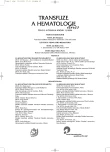-
Medical journals
- Career
Anagrelide in the treatment of thrombocytosis in myeloproliferative disease – case report
Authors: J. Pelková
Authors‘ workplace: Hematologicko-transfuzní oddělení, Baťova krajská nemocnice Zlín
Published in: Transfuze Hematol. dnes,12, 2006, No. 2, p. 104-106.
Category: Comprehensive Reports, Original Papers, Case Reports
Overview
There is presented a case report of using anagrelide hydrochloride as a non-toxic oral inhibitor of thrombopoiesis in chronic myeloproliferative disorders (MPD). It is the first medicament to use for patients with histopathologically verified MPD – essential thrombocytosis. This treatment carries very good benefit for the quality of life. In medical literature we find reports where this therapy is used also in other types of MPD such as polycythaemia vera, chronic myelogenous leukaemia and myelofibrosis with myeloid metaplasia. We report our experience with using anagrelide as the third line therapy in patient with a diagnosis of MPD – by the PVSG rules – the essential thrombocytosis, but by the new WHO classification is as praefibrotic phase of chronic idiopathic myelofibrosis. In conclusion – anagrelide is an effective drug in the treatment of this disease, even in relatively low dose 1.0–1.5 mg per day.
Key words:
anagrelide, chronic myeloproliferative disorders, essential thrombocythaemia, chronic idiopathic myelofibrosis
Labels
Haematology Internal medicine Clinical oncology
Article was published inTransfusion and Haematology Today

2006 Issue 2-
All articles in this issue
- Is WT1 gene hyperexpression a malignant cells marker?
- Hemorrhagic complications during warfarin therapy
- Non-invasive prenatal diagnosis from maternal peripheral blood is performed on fractionated extracellular fetal DNA with size < 500 bp
- Idiopathic thrombocytopenic purpura in pregnancy refractory to immunosuppressive treatment – case report
- Anagrelide in the treatment of thrombocytosis in myeloproliferative disease – case report
- B-cell chronic lymphocytic leukaemia
- Chronic idiopathic myelofibrosis: biological characterization and histological “grading” of the fibrosis with respect to diagnosis and prognosis
- TEL/AML1 increases sensitivity of leukemia cells to L-Asparginase by induction of metabolic stress
- Transfusion and Haematology Today
- Journal archive
- Current issue
- Online only
- About the journal
Most read in this issue- Chronic idiopathic myelofibrosis: biological characterization and histological “grading” of the fibrosis with respect to diagnosis and prognosis
- Anagrelide in the treatment of thrombocytosis in myeloproliferative disease – case report
- Hemorrhagic complications during warfarin therapy
- Idiopathic thrombocytopenic purpura in pregnancy refractory to immunosuppressive treatment – case report
Login#ADS_BOTTOM_SCRIPTS#Forgotten passwordEnter the email address that you registered with. We will send you instructions on how to set a new password.
- Career

